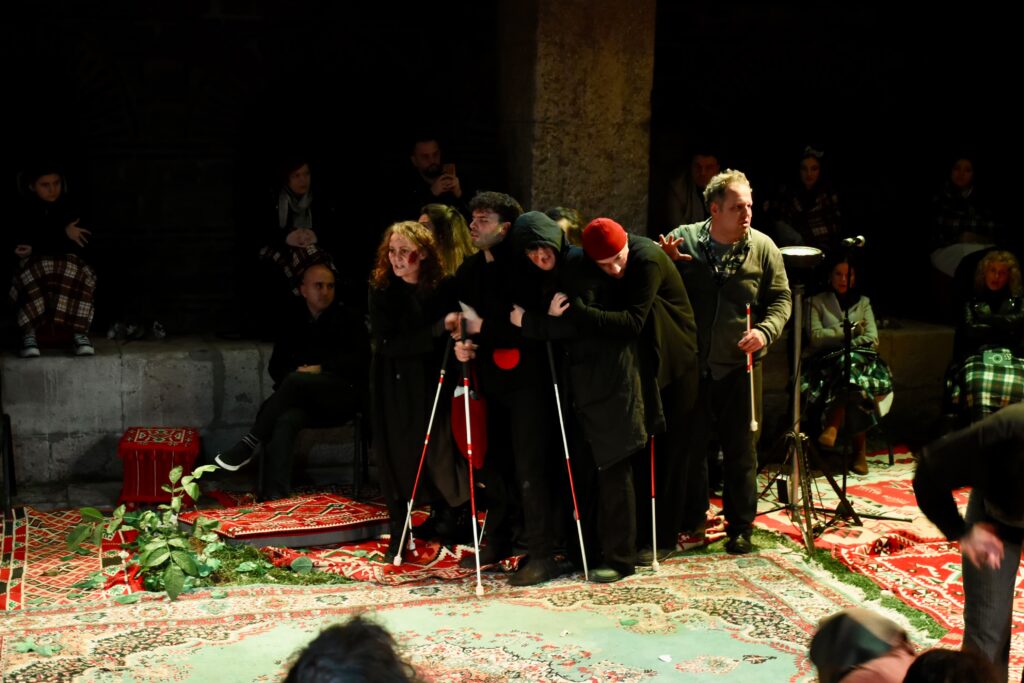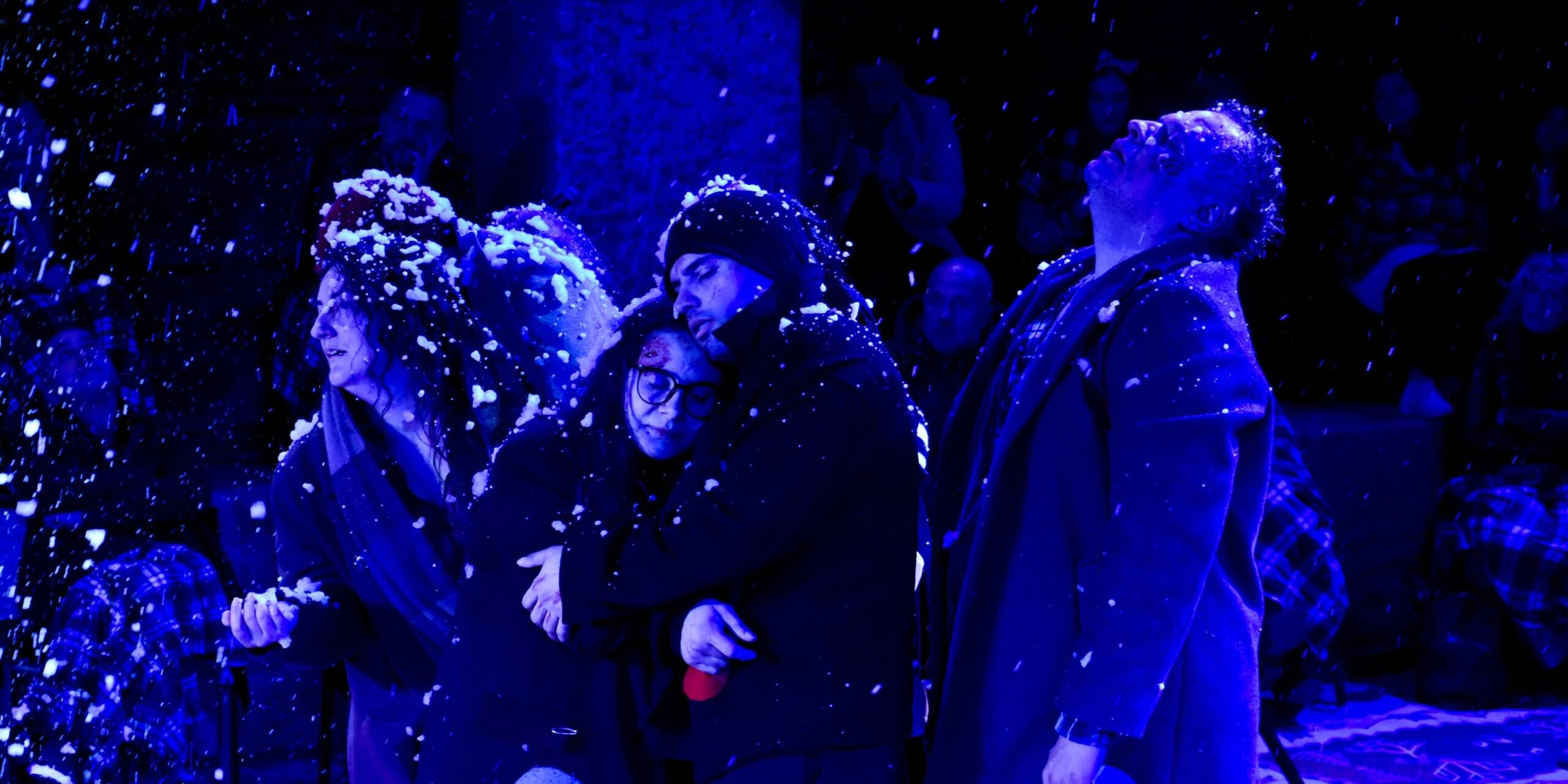National Turkish Theatre of North Macedonia (presented as part of the Kosovo/North Macedonia Theatre Showcase)
In a region where identity has long been both a bridge and a border, The Blind speaks about the necessity of coexistence — not as a slogan, but as an invitation to reflection. Directed by Qëndrim Rijani and performed by the National Turkish Theatre of North Macedonia, this adaptation of Maurice Maeterlinck’s symbolist play, infused with fragments inspired by Amin Maalouf’s In the Name of Identity, transforms Maeterlinck’s timeless allegory into a living reflection on identity and coexistence — a reminder that theatre remains one of the rare places where diversity can be felt, not merely discussed.
Maeterlinck’s original drama follows a group of twelve blind people lost in a forest, waiting for their priest-guide who, unknown to them, has died beside them. Frozen in fear and uncertainty, they can neither return nor move forward, condemned to wait for a revelation that never comes. Rijani’s version keeps the essence of this parable but reshapes it with ten blind characters and their fallen leader, shifting the focus from mystical faith to the human need for guidance and connection. Their physical disorientation becomes a mirror of contemporary confusion — of not knowing where we stand or who leads us — while the director opens the text toward the actors’ own experiences of belonging and loss.
The performance was presented at the Kosovo/North Macedonia Theatre Showcase, organized by Qendra Multimedia, which brought together some of the most distinctive voices from both countries. For this occasion, The Blind was staged in the courtyard of Kurshumli An, a historic setting that stands as a quiet reminder of the coexistence and crossings that have shaped this region for centuries. Once an inn welcoming travellers from distant lands, the place now echoes the same spirit of encounter.
Rijani uses the space not merely as a background but as part of the play’s language. The Blind opens with a quiet reading from Maalouf’s In the Name of Identity, a moment that invites contemplation. Then, suddenly, the actors appear on the walls of Kurshumli An, caught in a confrontation that breaks the stillness. As they descend among the audience, abstraction turns into action — the theme of identity becomes immediate, embodied. What follows feels almost like a confession: the ensemble addresses the audience directly, speaking about their own reality as part of the National Turkish Theatre. This brief yet powerful sequence grounds the performance in the present, linking the metaphorical blindness of Maeterlinck’s text with the tangible challenges of a theatre — and a community — still searching for its place.
In its directorial composition, The Blind shifts fluidly between two worlds — Maeterlinck’s poetic text and the actors’ personal narratives. The transitions between them are organic, marked by light, gesture, or a shared breath rather than abrupt cues. These narratives are not delivered as individual monologues but unfold as directed ensemble scenes, where personal experience becomes collective expression. They vary in tone — some marked by struggle or loss, others by tenderness, humour, or moments of celebration that reveal how life insists on joy even amid uncertainty. Together, they expand the meaning of blindness beyond the physical absence of sight, turning it into a metaphor for misunderstanding, fear, or simply the limits of empathy. The multilingual texture of the performance — spoken in Turkish, Macedonian, Albanian, English, and German — adds another layer of authenticity. Though rooted in local experiences, The Blind speaks with unmistakable universality, resonating across borders in a time when globalisation brings people closer yet often deepens the divides between them.

The Blind
Visually, the production reveals a carefully shaped yet dynamic stage language. The island-like space, surrounded by the audience on all sides, embodies Maeterlinck’s metaphor of isolation, but the actors constantly break through it. They move between the spectators, weaving among the chairs, sometimes addressing them directly or even placing their probes into their hands — making them, for a moment, guides or companions in the shared darkness. The contrast between stillness and sudden movement creates a vivid tension, a rhythm of closeness and distance that keeps the audience alert and emotionally involved. Dark costumes, with slight variations of texture and tone, allow individuality to emerge without breaking the unity of the ensemble. On the ground, carpets in oriental and Balkan patterns form a soft, symbolic landscape — a reminder that cultural intersections are not abstractions but textures we live among.
The music, composed largely of pieces by Ibrahim Maalouf with added oriental motifs, shapes the emotional architecture of the play. It flows through scenes like memory — melancholic, searching, never fully resolving. The open-air acoustics deepen its resonance, connecting the performance to the world beyond its boundaries. The director’s integration of music, gesture, and silence reveals a style that blends precision with openness — a hybrid aesthetic where classical dramaturgy meets postdramatic sensibility. He builds from fragmentation yet achieves cohesion, not through plot but through rhythm and emotional logic.
The ensemble performs as a true collective. Each actor contributes to the continuous pulse of tension and intimacy that defines the piece. Slagjana Vujosevik remains at its centre — confident, playful, and commanding. Her presence bridges the two realities of the performance, guiding and misleading the others, sometimes playing with fear, sometimes with tenderness. Around her, the cast creates a living circle of vulnerability and strength, embodying both the literal and metaphorical blindness that binds them together.
The director approaches theatre as a living process rather than a fixed result. His productions rarely freeze after the premiere; he continues to refine them, following the actors’ growth and the shifting social landscape in which they play. In this latest version of The Blind, the addition of Edis Musić and Ebru Musli subtly changes the ensemble’s rhythm and emotional temperature. The work continues to evolve — with its actors, its maker, and the times it reflects.
The closing image, where a baby is raised toward the sky, remains the most haunting. It recalls innocence untouched by divisions — a symbol of beginnings and of the hope that future generations might carry fewer burdens of identity. In the director’s vision, it is also an image of continuity: even as darkness surrounds, there is always a fragile light we can choose to lift higher.
The Blind remains a living dialogue — between texts, between cultures, between people learning to see one another and discovering strength in shared presence. Widely recognised as the best Macedonian production of the past season, it is intellectually sharp, emotionally resonant, and socially courageous. Though born from local realities, it speaks to the world we all inhabit — fractured, interwoven, and still learning how to see one another. After witnessing it, we leave changed — seeing more clearly, and reminded of the strength that comes from standing together.
Credits
Director: Qëndrim Rijani// Based on Maurice Maeterlinck’s “The Blind” and motifs from“In the Name of Identity” by Amin Maalouf // Costume design: Medina Hoxha and Maja Gjureska//Music: Emrah Xhemaili
Performed by Cenap Samet, Hakan Daci, Yetkin Sezari, Suzan Akbelge, Ebru Musli, Nesrin Tair, Slagjana Vujosevik, Emine Halil, Zübeyde Ali, Ines Radoncik, Edis Music
Katerina Markoska is a translator, theatre critic, and emerging author from North Macedonia, living between Skopje and Sofia. She is currently completing a master’s
degree in Theatre Arts and Dramaturgy at the National Academy for Theatre and Film Arts “Kr. Sarafov” in Sofia. Her translations of contemporary drama have been
recognized by Eurodram, and her creative texts have been published in collective books in Bulgaria.








